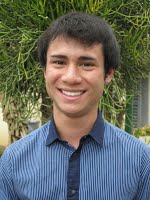Josh Wong

Joshua Wong, a Harvard Medical School student, grew up in the small farming town of Lodi, California. Taking a cue from his father -- a physician who has worked extensively with the Latin American diaspora in California's Central Valley -- Wong knew he wanted to work in medicine even as an undergraduate student at Stanford University.
During college, Wong volunteered in Tanzania for a summer, completed an honors thesis exploring the immune responses to measles vaccines in HIV-positive adults, and worked as a patient advocate in local community health clinics in the San Francisco Bay Area.
After graduating in 2010 with a degree in human biology, Wong was awarded the Stanford International Public Service Fellowship and went to conduct research with KEMRI-CDC in Kibera, a slum area in Nairobi, Kenya. Wong aims to work with WHO or CDC helping to build public health programs that combat infectious diseases.

Project: "Changes in Specificity of HIV-1-Specific CD4 T Cell Responses following Acute HIV-1 Clade C Infection"
June 18, 2013 - August 14, 2013
Durban, South Africa
What does the Kean Fellowship mean to you?
I am so honored and humbled to be among the recipients of this award. It really was an incredible asset to my summer since I could not have conducted this research without this funding.
What do you anticipate learning?
The Kean Fellowship made it possible for me to get a taste for what laboratory work overseas meant. I have worked in laboratory sciences in the U.S. and in public health abroad, but how the science of diseases that affect the developing world is conducted in these countries is something that I had never experienced before. It challenged me to think differently about the role of scholarship and "high science" in poor countries and has made me passionate about supporting young scientists with the resources to conduct the research that is vital to their own countries.
What interests you about tropical medicine and what problems are you interested in solving?
My interest in tropical medicine is largely due to my family, many of whom have come from poor countries where they were affected by preventable infectious diseases. Throughout my studies and time abroad, I have come to a better understanding of how tropical diseases are the result of many injustices that have been borne by globally disenfranchised communities. I believe that studying medicine and tropical diseases will make me a much more powerful advocate for these communities. One of the problems that I am very interested is the role of the HIV epidemic in the epidemiology of preventable infections like influenza, measles, and diarrhea. Will a globally immunosuppressed population experience the re-emergence of diseases that we think are on the decline? Should vaccination and eradication efforts worldwide be rethought in light of this epidemic?